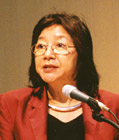 Keynote Personal 3
Keynote Personal 3

- Pasuk Phongpaichit
-
- Professor Faculty of Economics, Chulalongkorn University
Until recently, Thailand has seemed to be of the more traditional societies in Asia. The economic boom and bust since 1985, which took place in the age of globalisation, has changed that. The enormous physical change in Bangkok is a metaphor for much wider changes throughout the society.
At the national level, the 1997 crisis provoked a big debate over what sort of economy and society we want. Should we modernise faster, or try to slow things down? The end result of this debate has been rather paradoxical. On the one hand, the post-crisis government has tried to "look inward", promote local enterprise, and reduce dependence on the outside. This builds on the way that many people and many communities responded to the crisis _ by sharing the burden and helping one another.
But on the other hand, we have understood more deeply than ever before that in the age of globalisation, an individual country cannot adjust alone. It needs patrons and allies. Thailand looked to Japan for help during the worst phase of the crisis. Thailand is now looking to Asia as a whole to build institutions and relationships that can prevent future crises and ensure more stable and equitable growth.






